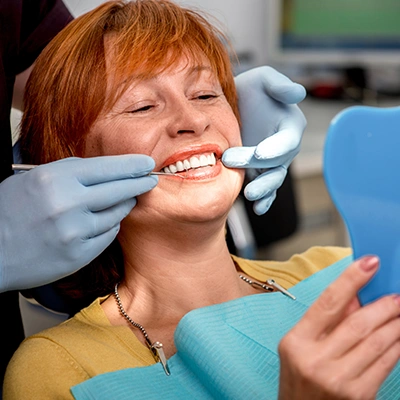Dental implants have revolutionized dentistry, offering a durable and aesthetically pleasing solution for replacing missing teeth. Unlike dentures or bridges, dental implants are anchored directly into the jawbone, providing a stable and permanent replacement for teeth.
However, despite their numerous benefits, it’s not uncommon for individuals to report feeling sick after their surgery, which can be concerning and frustrating, especially when the reasons for these symptoms aren’t immediately clear.
So, if you are wondering, “Why do I feel sick after dental implants?” then this is the right guide for you!
Whether it’s the effects of anesthesia, medication side effects, or even stress and anxiety, we will help you understand why you might feel sick after dental implants and how you can alleviate these symptoms.
What are Dental Implants?
Dental implants are advanced dental prosthetics used to replace missing teeth. They consist of three main components: a titanium post, which acts as the root of the tooth; an abutment, which is a connector piece; and a crown, which is the visible part of the tooth.
The titanium post is surgically implanted into the jawbone, where it fuses with the bone over time (osseointegration), creating a strong and stable foundation for the artificial tooth.

Typical Recovery Timelines Post-Procedure
Immediate Recovery (First 24-48 Hours)
Swelling, bruising, minor bleeding, and discomfort are fairly common post a dental implant surgery.
Short-Term Recovery (First Week)
Your swelling and bruising should start to decrease after 2-3 days. Minor bleeding and oozing may continue but should taper off after a few days. If your dentist used non-dissolvable stitches, they might need to be removed by your dentist.
Medium-Term Recovery (2 Weeks to 3 Months)
Osseointegration is the process where the implant fuses with the jawbone. This is crucial for the stability of the implant. In this stage, you will be required to visit your dentist for regular checkups.
Long-Term Recovery (3 Months and Beyond)
Once osseointegration is successful, a minor procedure to place the abutment is performed, followed by a short healing period. After the gum tissue heals around the abutment, the custom-made crown is attached, completing the restoration process.
Most patients fully recover within 3 to 6 months, depending on individual healing rates and any additional procedures performed (such as bone grafts).
Why Do I Feel Sick After Dental Implants?
Some of the common causes that might answer your question of “Why do I feel sick after dental implants?” include:
Anesthesia & Sedation
Dentists usually use local anesthesia, general anesthesia, or oral sedation for a dental implant procedure. Anesthesia drugs can alter brain function and blood pressure, leading to dizziness and lightheadedness as the body readjusts. It can also lead to a drop in blood pressure, leading to feelings of weakness and nausea.
Common symptoms of post-surgery anesthesia sickness include:
- Nausea and vomiting
- Dizziness and lightheadedness
- Fatigue and drowsiness
- Dry mouth and throat irritation
- Confusion and memory loss
Pain & Discomfort
After dental implant surgery, experiencing pain and discomfort is common and expected as part of the healing process. However, these sensations can contribute to feelings of sickness, including nausea and general malaise.
Pain can also make it difficult to sleep, leading to fatigue and a weakened immune system. Lack of sleep can exacerbate feelings of sickness and slow down the healing process.
Infection
Dental implant infections can occur following the placement of dental implants, which are titanium posts surgically embedded into the jawbone to support artificial teeth. While dental implants are generally safe and effective, infections can sometimes develop, posing risks to both oral health and overall well-being.
Poor oral hygiene, bacterial contamination, prior medical conditions, or smoking can be a few of the reasons why you get a dental implant infection, which can lead to you feeling sick after getting dental implants.
Medication Side Effects
After undergoing dental implant surgery, your dentist may prescribe medications to manage pain, prevent infection, and aid in the healing process. While these medications are essential for recovery, they can sometimes cause side effects that make you feel sick.
Allergic Reactions
Allergic reactions can occur after getting dental implants, particularly in response to materials used to create dental implants. Allergy to titanium is fairly rare, but patients can potentially develop them. These reactions can vary in severity, from mild irritation to potentially life-threatening conditions, making you feel sick after dental implant surgery.
Differentiating Between Normal & Abnormal Symptoms After Dental Implants

Normal Symptoms After Dental Implant Surgery
Pain and Discomfort
Normal: Mild to moderate pain and discomfort around the implant site
Abnormal: Severe, worsening pain that is not relieved by prescribed pain medications
Swelling
Normal: Swelling around the implant site and possibly in the cheeks and jaw within the first 48 hours post-surgery
Abnormal: Excessive swelling that increases over time, especially accompanied by pain, redness, or heat.
Bruising
Normal: Some bruising around the implant site and possibly extending into the cheeks
Abnormal: Persistent or spreading bruising beyond the immediate surgical area
Bleeding
Normal: Minor bleeding or oozing from the implant site, which should diminish within the first 24-48 hours.
Abnormal: Persistent or heavy bleeding that does not respond to gentle pressure or continues after the first day.
Fatigue & Discomfort
Normal: Feeling tired, weak, or generally unwell for the first few days post-surgery
Abnormal: Severe or persistent fatigue, weakness, or malaise beyond the initial recovery period.
Abnormal Symptoms after Dental Implants
- Fever: A fever over 100.4°F (38°C) is a sign of infection and requires prompt evaluation by your dentist or healthcare provider.
- Severe Pain or Swelling: Intense, throbbing pain or swelling that worsens instead of improving, especially after the first few days, may indicate infection or other complications.
- Pus or Bad Odor: Any discharge of pus from the implant site or a foul odor could signify infection and should be reported to your dentist immediately.
- Difficulty Breathing or Swallowing: Any difficulty breathing, swallowing, or persistent tightness in the throat should be treated as a medical emergency, as it could indicate a severe allergic reaction or other serious complications.
How to Manage Post-Implant Sickness
- Take prescribed pain relievers as directed by your dentist.
- Apply an ice pack wrapped in a cloth to the cheek near the surgical site. This can help reduce swelling and numb the area, easing discomfort.
- Drink plenty of water to stay hydrated and help flush out any medications from your system.
- Ginger tea or ginger candies can help alleviate nausea.
- Eat small, bland meals to ease digestion. Avoid spicy, acidic, or fatty foods that can aggravate nausea.
- Allow your body ample time to recover by getting plenty of rest.
- Keeping your head elevated while sleeping can help reduce swelling and improve comfort.
- Follow your dentist’s instructions for brushing and flossing around the implant site. Use a soft-bristled toothbrush and avoid vigorous rinsing or spitting, especially in the first few days.
- Rinse your mouth gently with warm salt water (1 teaspoon of salt in a cup of water) several times a day to promote healing and reduce bacteria in the mouth.
- Follow your dentist’s instructions precisely regarding the timing and dosage of prescribed medications.
- If you experience severe or persistent symptoms like nausea, inform your dentist. They may adjust your medication regimen or provide alternative treatments.
- Be vigilant for signs of infection, such as increasing pain, swelling, redness, pus, or fever. Report any concerns promptly to your dentist.
- Attend all scheduled follow-up appointments with your dentist to monitor healing progress and address any complications early.
Conclusion
Understanding why you might feel sick after dental implants involves recognizing various factors that can contribute to post-operative discomfort.
It’s essential to follow your dentist’s post-operative care instructions diligently, seek prompt medical attention for any concerning symptoms, and maintain open communication throughout your recovery journey.
With proactive management and awareness of potential challenges, you can mitigate discomfort and ensure a smoother healing process following dental implant surgery.
Discover Seamless Recovery with Centers for Dental Implants
Ready to experience comfort and excellence in dental implant post-surgery care?
Contact us today to schedule your consultation and ensure a smooth path to a confident smile.
FAQs
How long does it take to recover from dental implant surgery?
Recovery times can vary depending on individual health and the complexity of the procedure. Typically, initial healing takes about 1-2 weeks, during which mild discomfort and swelling may occur. Full integration of the implant with the jawbone (osseointegration) can take several months. Your dentist will provide a personalized recovery timeline and instructions tailored to your specific needs.
How can I manage nausea or other discomforts after dental implant surgery?
Stay hydrated by drinking water and avoid strong odors or foods that may trigger nausea. Taking prescribed medications as directed by your dentist can help alleviate pain and manage symptoms effectively. If symptoms persist or worsen, contact your dental provider for advice on adjusting your treatment plan or addressing potential complications promptly.

